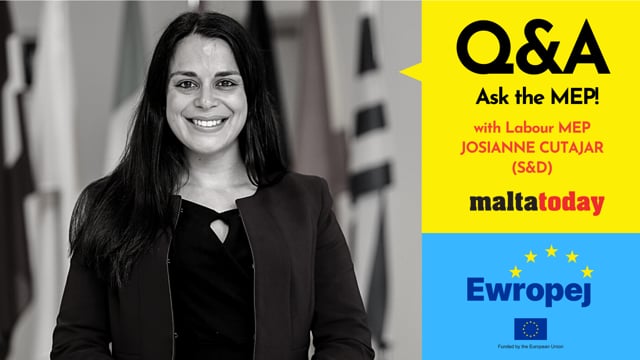[WATCH] Not enough being done for EU island states, MEP Josianne Cutajar says
Ask the MEP! | Our reporter Nicole Meilak spoke with Labour MEP Josianne Cutajar to learn more about her work in the European Parliament on small islands, digitalisation, and the green transition


Despite an estimated 2,400 inhabited islands across the EU member states, Labour MEP Josianne Cutajar warns that the European Union is not doing enough for island states like Malta.
“Between what is being said and what is being done in practice, the European Union is not doing enough,” she said during our Ask the MEP! interview series.
Cutajar is currently the shadow rapporteur for the committee of the regions. The committee is working on a report about island states, and Cutajar’s role is to negotiate amendments to the report so that the final product is approved in parliament.
“From the day I set foot in the parliament I always pushed for islands to get more recognition and support at the international level,” Cutajar said of her work on the report.
The last piece of European legislation that touched on EU islands was quite “light”, in Cutajar’s words. However, this upcoming report is said to be more full-bodied.
Cutajar said this new report would affect Malta and Gozo by elevating their status as a priority, rendering the archipelago the target of more initiatives and support.
The same report emphasises the importance of SMEs located in Europe’s islands. Cutajar said there needs to be more flexibility with state aid rules so that island SMEs can be better supported in their growth.
The European Parliament is currently helping SMEs in Malta by providing advisors and contacts, programs and initiatives to help people access the support funds they qualify for and understand what opportunities are available to them.
The digital decade
“In 10 years, we need 100% of all public services to be digitised and accessible online,” Cutajar said.
Cyber security, artificial intelligence and connectivity are all part of the digital move too and discussions in Parliament are ongoing on all of these topics.
“What is coming is a twin transition, basically the technological and environmental changes we need to make are connected and will be carried out concurrently with targets and work in those areas.”
Among other issues is that of connectivity, namely proposed plans for 5G service across the EU. Introducing fast connectivity services would help combat digital gaps for vulnerable people and those living in remote areas.
“We had cases caused by the pandemic where workers and students couldn't attend to their duties because they couldn't afford to access the internet… Things like this illustrate how as time goes on human rights could also come to encompass access to the internet and digital technology.”
She added that digital technology can help with energy efficiency while propelling the EU towards a carbon neutral model in line with 2030 targets.
But digital technology can pose tough ethical dilemmas, such as with artificial intelligence. “We need to have clear rules to determine blame and also give adequate protection and compensation for citizens in case AI causes them harm, such as in the case of a self-driving car crash.”
“I think we need a balance between regulation and research and development...Regulation gives a certain level of certainty and basis by which prospective investors can feel secure and assess what they want to support...These challenges are also opportunities.”

This article is part of a content series called Ewropej. This is a multi-newsroom initiative part-funded by the European Parliament to bring the work of the EP closer to the citizens of Malta and keep them informed about matters that affect their daily lives. This article reflects only the author’s view. The action was co-financed by the European Union in the frame of the European Parliament's grant programme in the field of communication. The European Parliament was not involved in its preparation and is, in no case, responsible for or bound by the information or opinions expressed in the context of this action. In accordance with applicable law, the authors, interviewed people, publishers or programme broadcasters are solely responsible. The European Parliament can also not be held liable for direct or indirect damage that may result from the implementation of the action.






.jpg)












.jpeg)






